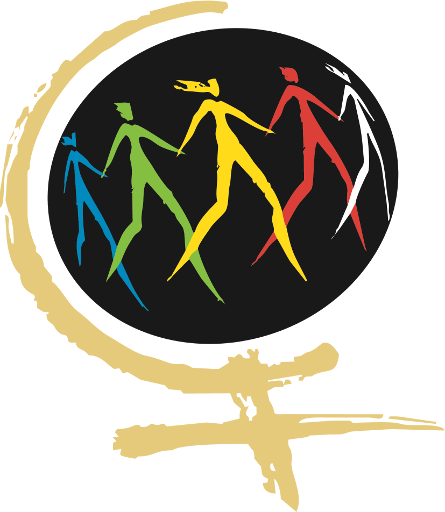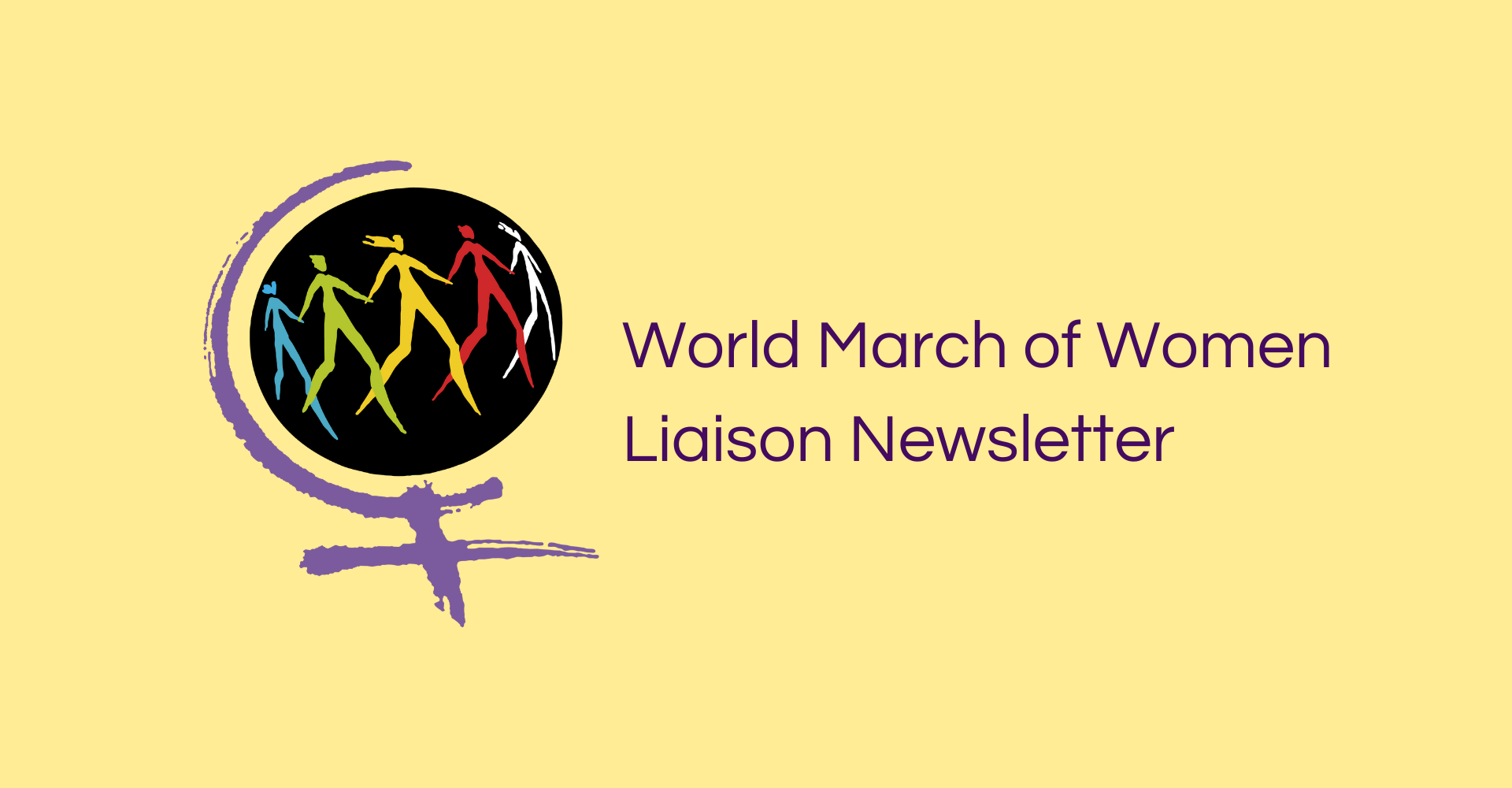Greetings from the WMW International Secretariat
Dear sisters, we hope you are all well and safe. We have lived through difficult and challenging times in all parts of the world, and we know that women have guaranteed the sustainability of life from our territories. The crises provoked by patriarchal, racist, fundamentalist and neoliberal capitalism are innumerable and that is why we continue to be moved by our motto “we resist to live, we march to transform”.
This bulletin was elaborated between August and September and gathers some information from the regions where we articulate ourselves and build the movement. We take this opportunity to emphasize that we strive to continue to improve our communication tools, so if your NCB would like to share news and other information with us, please contact us by email: info@marchemondiale.org
NCBs 2022 Contact Update
To strengthen our connection, we are sending you in this e-mail a form to update the list of contacts and registrations of the National Coordinations of the World March of Women (NCBs) around the world.
The WMW is composed of NCBs, groups of active participants and supporters. The National Coordinating Bodies bring together the Participant Groups active in a specific country/territory: they are the organizational structure of the WMW at the national level. The WMW recognizes nations struggling for self-determination, which can form NCBs according to the request of local active Participant Groups.
Active Participating Groups can be an autonomous women’s group, a women’s committee within a mixed group (groups in which both men and women participate) or a mixed organization that does not have a women’s committee but within which a women’s group is responsible for the leadership of the WMW.
We ask NCBs to respond by October 5, 2022.
If your NCB did not receive the link to the form by e-mail please contact: info@marchemondiale.org
International Solidarity to women and the people of Chile
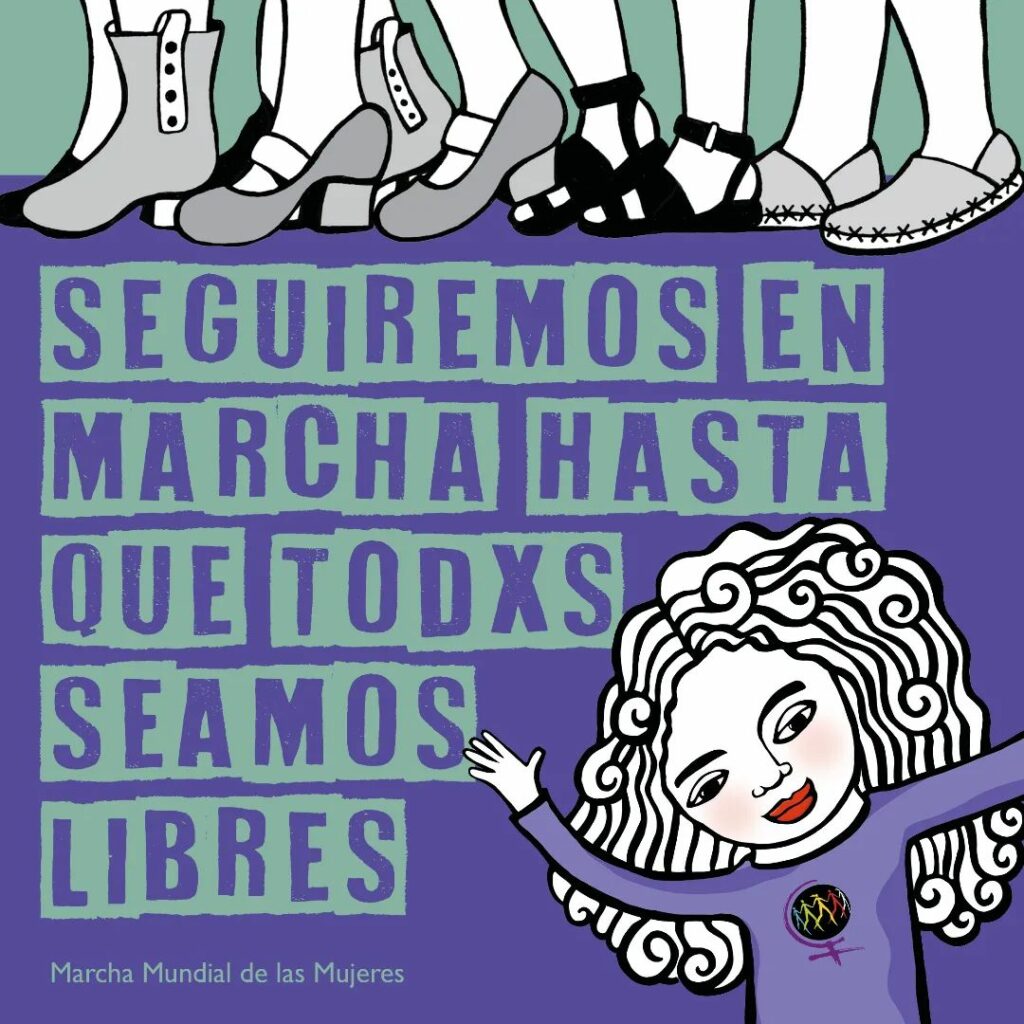
From the World March of Women we send our feminist solidarity to people of Chile for the non-approval of the draft constitution presented by the Constituent Convention. The text in force in the country is from 1980, promulgated by the dictatorship of Augusto Pinochet. For a better understanding of the process, see the text published in Capire.
The following is a brief note from the WMW Chile:
“Today our motto makes us more sense than ever, we will continue resisting, fighting and building community. We will continue articulating and weaving networks that raise alternatives for the good living, for the defense of life, of our bodies and territories. We continue and will continue, because in the words of our sister Miriam Nobre, we are certain that the only possibility to embrace again is to destroy, is to overcome racist and patriarchal capitalism! We Resist to Live We March to Transform!”
In memorian: Lorraine Guay, Our Sister in Struggle
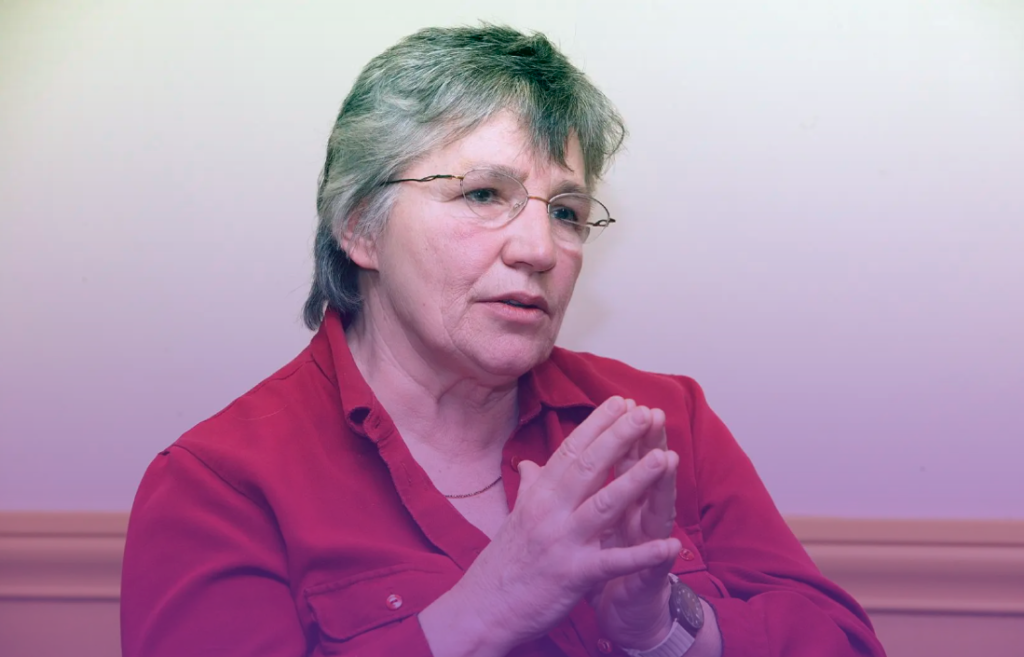
“Not alone, never alone, always together”: activists pay tribute to one of the founders of the World March of Women
On June 17, we were devastated to learn of the death of our dear friend and sister in struggle, Lorraine Guay. We want to share our deep sorrow, and above all our immense admiration, for the woman who inspired countless activists over the last half century.
Her legacy reminds us to persevere when things go wrong, to connect and move forward in spite of war, to act in the face of the relentless refusals of economic and political leaders to address climate change, to speak up and denounce the violation of rights, in spite of the rise of inequality and intolerance, to persevere for the day when we can move forward again.
Read the full text in memory of Lorraine at Capire
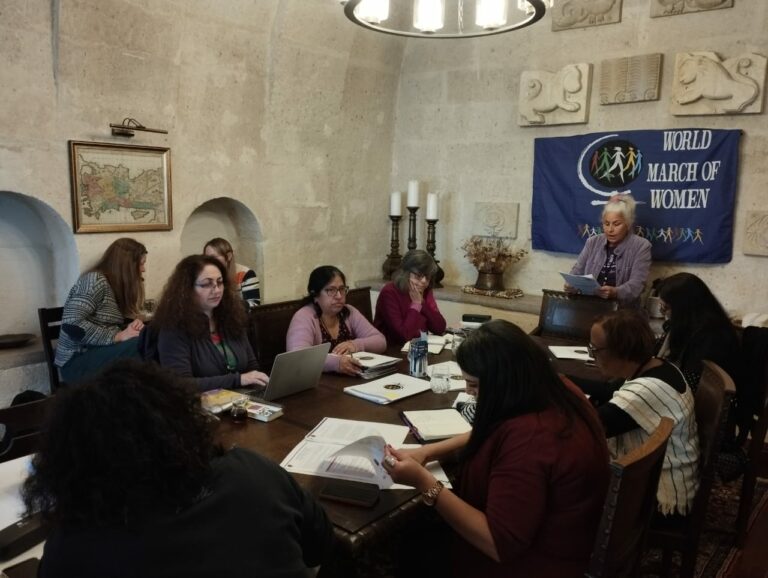
The New International Secretariat and Committee holds its first face-to-face meeting in Turkey
Last May the NCB Turkey held the face-to-face meeting with the members of the International Committee (IC) of the World March of Women representing the five regions in which we are present: Africa, Americas, Asia, Europe, MENA – Middle East, and North Africa. This is the first face-to-face meeting since the pandemic began and the first meeting of the new Secretariat (IS) and International Committee elected during the 12th international meeting, in October 2021.
Present members: Sofia Ngalapi (Tanzania) and Solange Kone, from Africa, Nalu Faria (Brazil) and Tita Godinez (Guatemala) from Americas, Bushra Khaliq (Pakistan) from the Asia-Oceania region, Luciana Alfaro and Garazi Roienetxea (Euskal Herria) from the Europe region, Ruba Odeh (Palestine) and Naama Nsiri (Tunisia) from the MENA region, and IS members Yıldız Temürtürkan, Pınar Yüksek and Mariami Gaprindashvili (Turkey) and Natalia Blanco (Brazil).
The meeting activities started with a welcome and a brief contextualization by Gülser Kayır, representing the National Coordination of Turkey. Until May 12, the IC discussed and identified the challenges and proposals of women in struggle in the territories from the national, regional, and international contexts; evaluated our latest actions, and discussion of a work plan to strengthen the NCBs linking to an international feminist agenda, anti-systemic and in solidarity. In this respect, the International Committee also takes up the reflections and demands identified during the 12th International Meeting, held virtually in October 2021.
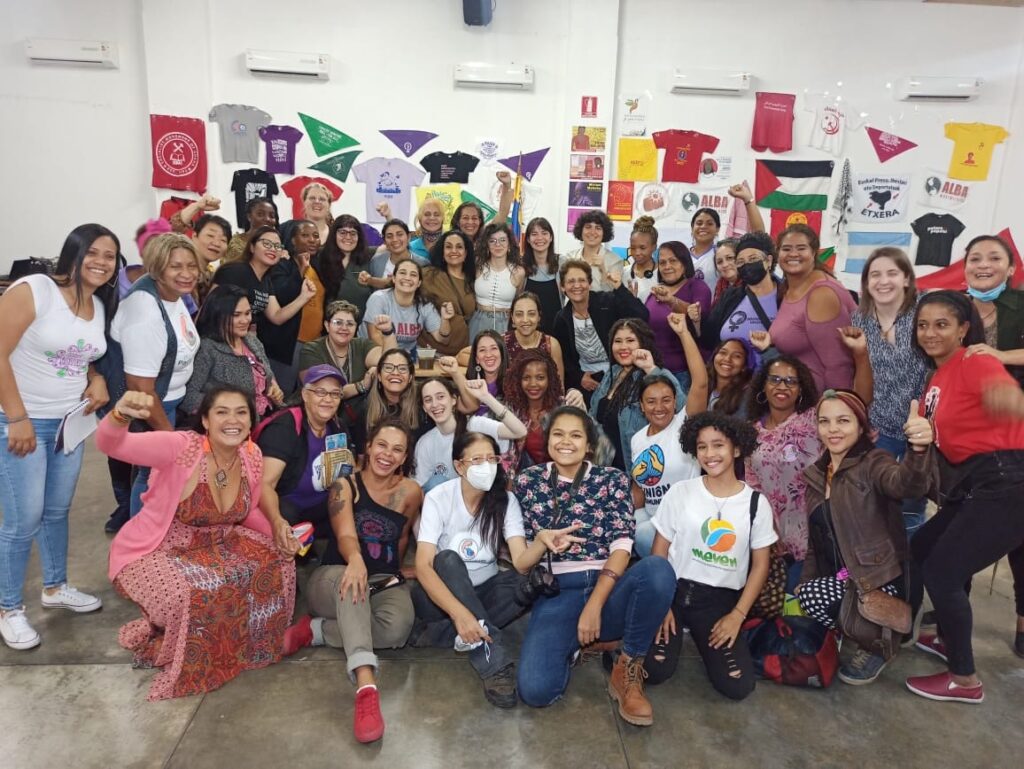
WMW participates in the First International Feminist Brigade “Alexandra Kollontai” in Venezuela
The First International Feminist Brigade “Alexandra Kollontai” took place in Venezuela between 17-27 June 2022 with 28 participants from 20 countries/6 regions.
The International Feminist Brigade had the chance to evaluate the main difficulties faced by women in the context of their struggle against patriarchal, capitalist, and imperialists, through visits, conversations, and meetings with women from the public and communes for 10 days. The World March of Women also participated in the brigade with Ella Craciun, Pınar Yüksek from Europe, Camila Dantas Araujo dos Santos, Marilys Zayas Shuman, Elpidia Moreno Hernandez, the Americas, Abeer Hasan A. Abu Khdeir, and MENA regions. Click and read the complete text
Also read on Capire portal: Feminism and Internationalism in Venezuela: Alexandra Kollontai Brigade
AFRICA
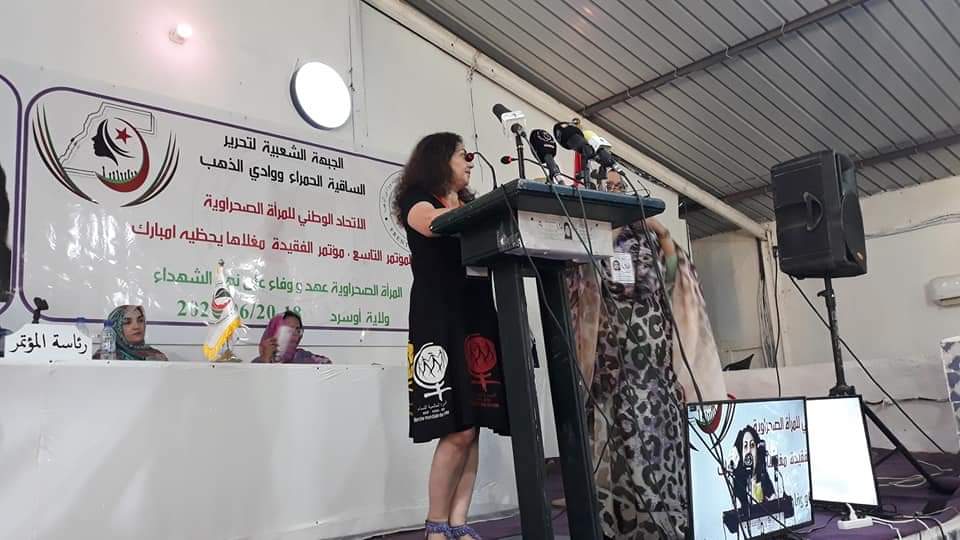
9th Congress of The National Union of Saharawi Women
9th Congress of the National Union of Saharawi Women (UNMS) took place in the Saharawi refugee camps in Tindouf (Algeria), from the 18th to the 20th of June 2022, under the title “Saharawi Women: commitment and loyalty to Martyrs’ path ”. It was very important for all Saharawi women to create such a space to reflect on our reality as a country and as women, as well as to work towards future initiatives to promote, on the one hand, political and social rights for our national cause and, on the other hand, women’s emancipation and to improve and enhance women’s social, political and productive presence at all levels.
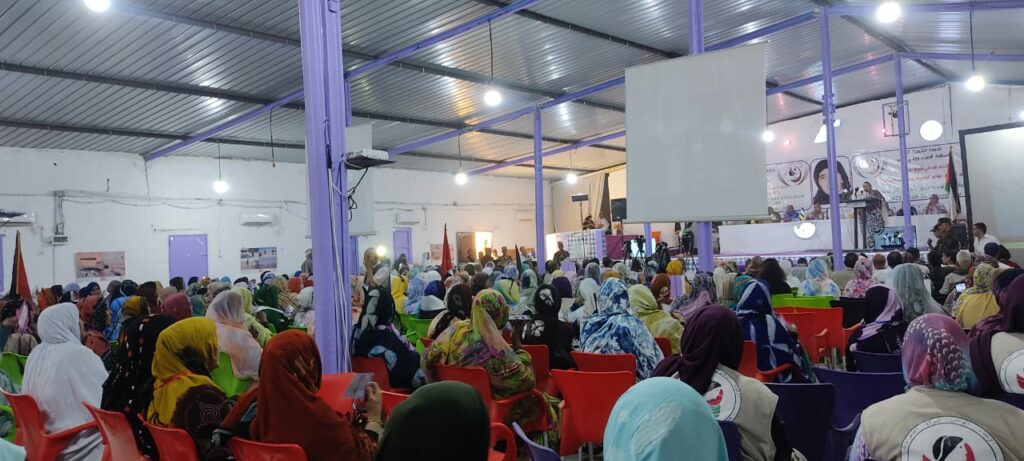
The 9th Congress of the Women’s Union was a great opportunity to highlight the struggle of Sahrawi women and the achievements and challenges of the past phase. The congress addressed the challenges facing Sahrawi women in the occupied territories and the heroic role led by militant and human rights activist Sultana Khaya, as well as women’s responsibilities in maintaining unity, strengthening resilience, and assuming responsibility in this exceptional circumstance.
The total number of congress participants is around 700. UNMS received a delegation of women from South Africa (three women of the South African parliament), Zimbabwe, Algeria, Turkey, Colombia, Spanish State, Germany, France, and Sudan. delegations representing many women organizations like the World March of Women, Pan_African Women Organization, and Fem_Wise Africa. WAELE Africa. On behalf of the World Women’s March, our international coordinator Yıldız Temürtürkan attended the congress.
The Congress also resulted in of new leadership our WMW’s sister Shabba Seini Brahim is the new Secretary General for the National Union of Saharawi Women as of 20 June 2022.
Tanzania
WMW Tanzania, Zanzibar, got an opportunity to be a part of facilitator on gender-based violence issues in a training on Gender-based violence held in June 2022. There were 32 participants. “It was so sad and touching that despite the effort made by the government, and national and international institutions on raising awareness about the issues, people especially those from remote areas still do not have enough knowledge and education about it. Women continue to be blamed instead of the perpetrator of violence against women, so this training is essential for understanding what violence against women is, for women to learn about their rights, and for ensuring gender equality in all societies”, shared our sister Sofia Ngalapi.
AMERICAS
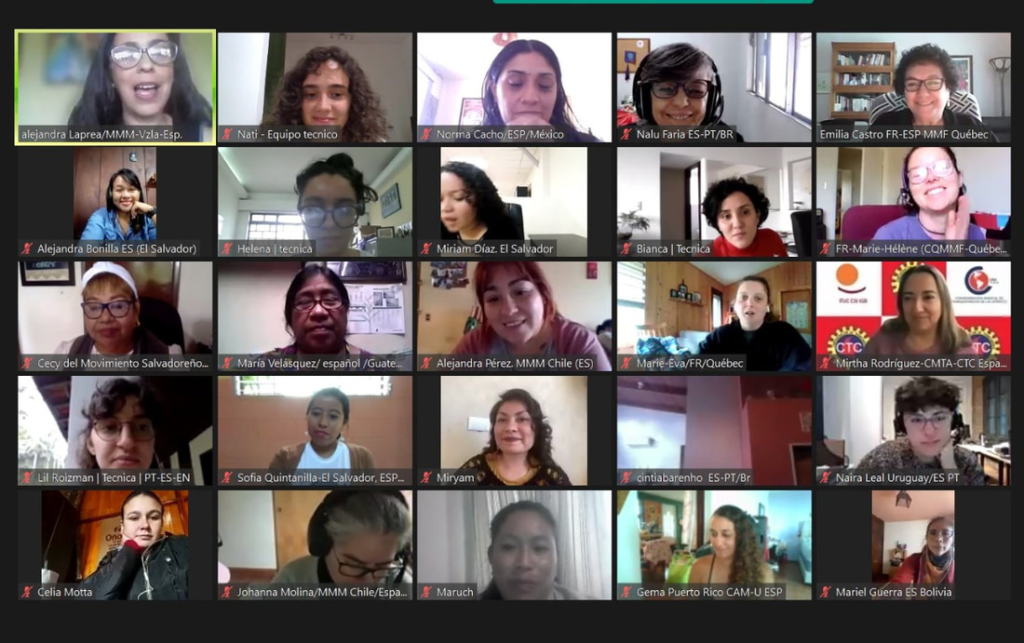
REGIONAL FEMINIST TRAINING SCHOOL: Popular and Feminist Education on the Internet
On May 12, 2022, the Berta Cáceres Feminist School WMW-Américas began formally, but it was made possible because for more than 6 months the methodology working group was thinking, dreaming and taking time and life to give body to the School.
“The main methodological challenge of the school was to define the three axes of the school: Systems of Oppression, Feminist Economics and Movement Building, and that these axes should have a logical, methodological sequence, a political sense of what we want to strive for with this school, which is to deepen the feminist economy of rupture as a practical and political proposition to subvert this capitalist, patriarchal, colonialist system of death…”

This rich process nourished by the territorial experiences from Guatemala, Mexico, Brazil, Venezuela and Chile is synthesized in a fragment extracted from the Manual of Feminist Popular Education: Sowing Gender Justice to Dismantle the Patriarchy, by the ally organization Amigos de la Tierra/Friends of the Earth: “When we talk about feminist popular education, we are talking about a rich and stimulating process of collective and personal growth and development that allows us to acquire a critical vision of the reality in which we are immersed under the logics of a capitalist, patriarchal, racist, colonial and heteronormative system.”

In the latest edition of the bulletin of the World March of the Americas it is possible to read reports and reflections from the NTCs and organizations that are articulated in the process of the Berta Cáceres WMW Americas Regional School. Or click on the title to access the texts:
Caribbean

For several years the World March of Women Américas has aimed at strengthening the participation of Caribbean organizations, an initiative that has been led by the Cuban National Coord. and that has found in the Berta Cáceres Feminist School a space to strengthen connections and incorporate new Coordinations.
With the presence of 11 sisters from the National Coordinations (NC) from Cuba and the Dominican Republic and allied organizations from Puerto Rico, Haiti, and Martinique, the Caribbean becomes visible and brings to the school reflections that further open the horizon of struggle of the WMW Américas.
- Feminist Puerto Rico
- Cuba: Permanent dialogue between theory and practice
- Martinique: Struggles that summon
Central America

From the Central American region, there are 18 compañeras participating, from El Salvador, Guatemala, Honduras, Panama and Costa Rica. The group also includes the participation of delegations from allied organizations to the March such as: Amigos de la Tierra (El Salvador and Costa Rica), Convergencia Sindical (Panama), Vía Campesina (Honduras), Movimiento de Mujeres del Campo MMC-ATC CLOC- Vía Campesina (Nicaragua) and Schafik Hándal Institute (El Salvador). From El Salvador, Honduras and Guatemala we bring some voices that summarize the participation of the NCs and partner organizations that make their lives in Central America.
- Guatemala: Feedback and greater knowledge
- Honduras- Vía Campesina: Feminist and popular methodology
- El Salvador: Tools to reach more women
South America

There are 34 South American women participating, from Argentina, Bolivia, Brazil, Chile, Colombia, Paraguay, Peru, Surinam, Uruguay and Venezuela. There are sisters from allied organizations such as REDES and CSA (Uruguay), Amigos de la Tierra and Alba Movimientos (Argentina) and Confluencia de Mujeres para la Acción Pública (Colombia).
Natalia Carrau from REDES (Uruguay) makes it clear in her presentation that we are very close to achieving this goal at the school:
“I work on economic justice issues and a few years ago we started incorporating the gender perspective into the analysis… we consider it essential to strengthen the structural and transversal analysis that the feminist perspective provides in all the work we do. On another level, at the national level we recently joined a political articulation of organizations that work against forms of violence against women and dissidents of the patriarchal and sexist system, for our organization it is essential to make a contribution to that construction that is informed, reflexive and that incorporates the analysis of the WMW.”
North America

In the North of the continent, the greatest contradictions of colonial and racist capitalism in the bodies of women and sexual dissidents are exacerbated and invisibilized, and for migrants, Afro-descendants, indigenous peoples and the working class.
Living in the belly of the beast, as Cindy Wiesner from GGJ calls the USA, or in a territory in permanent cultural resistance such as Quebec, is a great challenge for militancy and its work of resistance and assistance to people excluded from all rights.
Through the eyes of 9 compañeras, from Mexico, USA and Quebec the diversity of struggles of the north of the continent are presented and the richness of the march in the region and what the feminist school Berta Cáceres WMW Américas means.
ASIA
WMW Asia Regional Meeting in Nepal
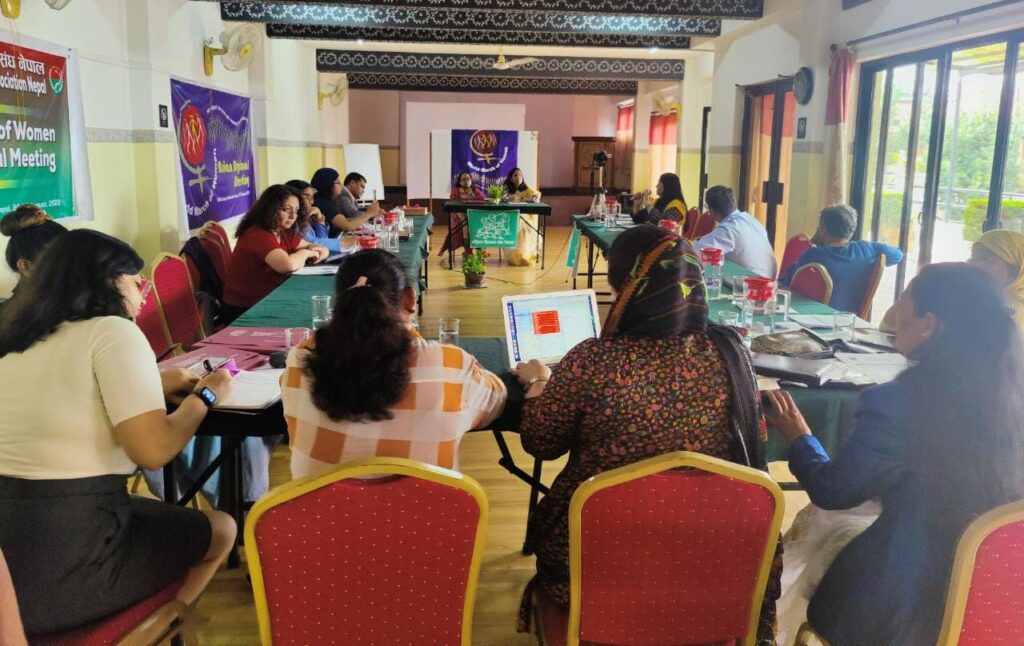
Between August 24 and 28, the MMM Asia region organized its first face-to-face regional meeting after the beginning of the pandemic. A very important moment for the re-articulation and strengthening of the countries in the region.
The women gathered in the city of Kathmandu, Nepal, and were welcomed by their colleagues from the Nepal Peasant Women’s Association, an organization that is part of the Nepal Peasant Federation, a member of Via Campesina.
About 20 representatives from countries such as Nepal, Pakistan, Sri Lanka, Bangladesh and India, as well as the WMW International Secretariat, are present to reflect together, share experiences of struggle and strengthen feminist, grassroots, anti-capitalist and anti-imperialist organizing in the region.
We have seen numerous cases, such as that of Afghanistan recently. This “hunt” for communists, socialists and other sectors considered progressive also reveals to us how imperialism has supported and sustained fundamentalist groups and organizations in various parts of the world; at the same time it has co-opted values related to human rights such as freedom and justice for all people. And we have to strengthen ourselves to confront this,” shared Bushra Khaliq, member of the WMW International Committee for the Asia region.
There were two days of plenary discussions and conversations with the attempt to identify and name the main challenges for women’s lives from topics such as the challenges of the current political context of States and Democracies; the advance of transnational corporations and militarized imperialism; a journey of the WMW about International Feminist Solidarity processes and our connection between struggles; also feminist and popular communication as a political strategy of organization and the experiences of IFOS and the Capire portal.
Pakistan: Three-Day Feminist School
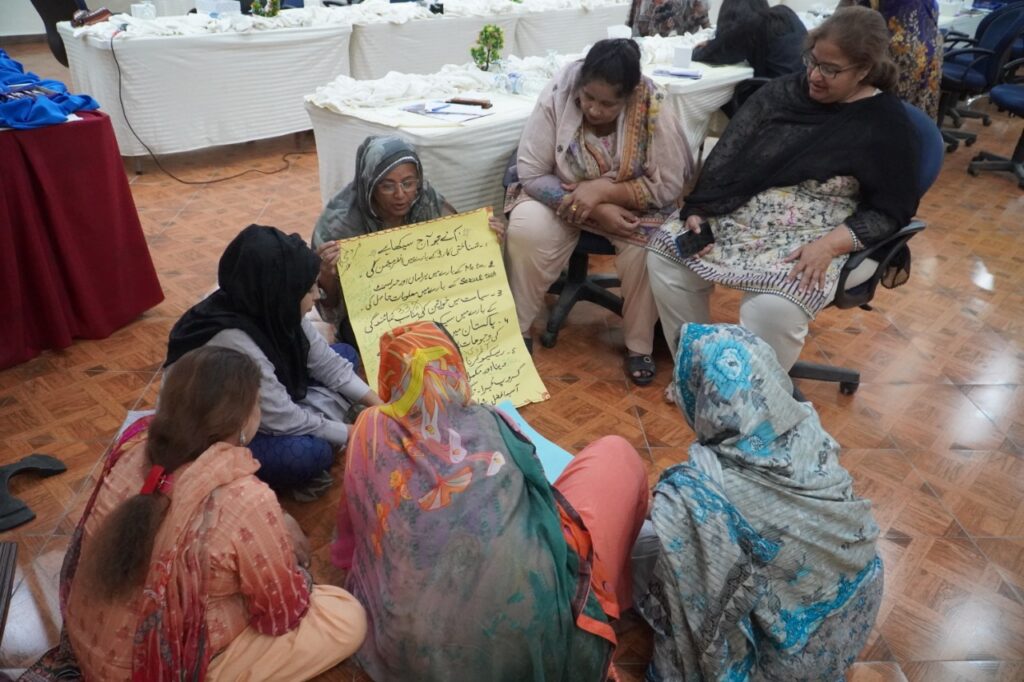
NCB Pakistan organized a three-day feminist school for the young activists from 29th -1st July. 20 young feminists actively participated. The main purpose of the Feminist School was to enhance the capacity of young girls to participate in such movements and understand how much the patriarchal system is dangerous for both men and women and to talk about the elements that exploit women.
Bushra Khaliq, IC member World March of Women explained about feminism, gender equality and feminist movements encompass the issues of women, transgender, labor, peasants, and environmental justice. Capitalism was discussed in detail. Industrial cities and urbanization have brought great stress on the labor force, common people, and women in households and working in factories face exploitation. The trainer also discussed the WMW’s recent campaigns including “NO to NATO” and “Rana Plaza Everywhere”.
EUROPE
Connecting women’s struggles: WMW holds the first Balkan Feminist Organising School in Turkey
In the last May 14, the Turkish NCB started with the Balkan Feminist Organizing School began with the participation of sisters from Bulgaria, Macedonia, Bosnia and Herzegovina, Albania, Romania, Armenia, Georgia, and Turkey. The school aims to start a process of articulation and organization of women in the region. About 35 women will be gathered for three days to know women’s organizations and share the struggles and alternatives that women have developed in their territories.
The training began with a greeting from Yıldız Temürtürkan, the international coordinator of the WMW, who introduced the World March of Women to the participants. “The new WMW international secretariat is in Turkey. With this challenge, we understand it as strategic for the feminist movement to connect with women’s struggles in Turkey and the Caucasus, Balkan, and Mediterranean regions”, said Yıldız. The school itself is a process that moves forward in grassroots feminism organizing and represents a process of political syntheses articulated with grassroots education methodologies, aiming to contribute to educating militants who are also educators and organizers of grassroots feminism in their countries and territories. During three days, the women discussed the themes: Systems of Oppression, Feminist Economy for building food sovereignty and climate justice, and Feminist and Popular Communication as a strategy for the democratization of communication and movement building.
The process initiated during these days will continue through virtual meetings to continue articulating the women’s organizations in the region and collectively building feminist formation to transform the world.
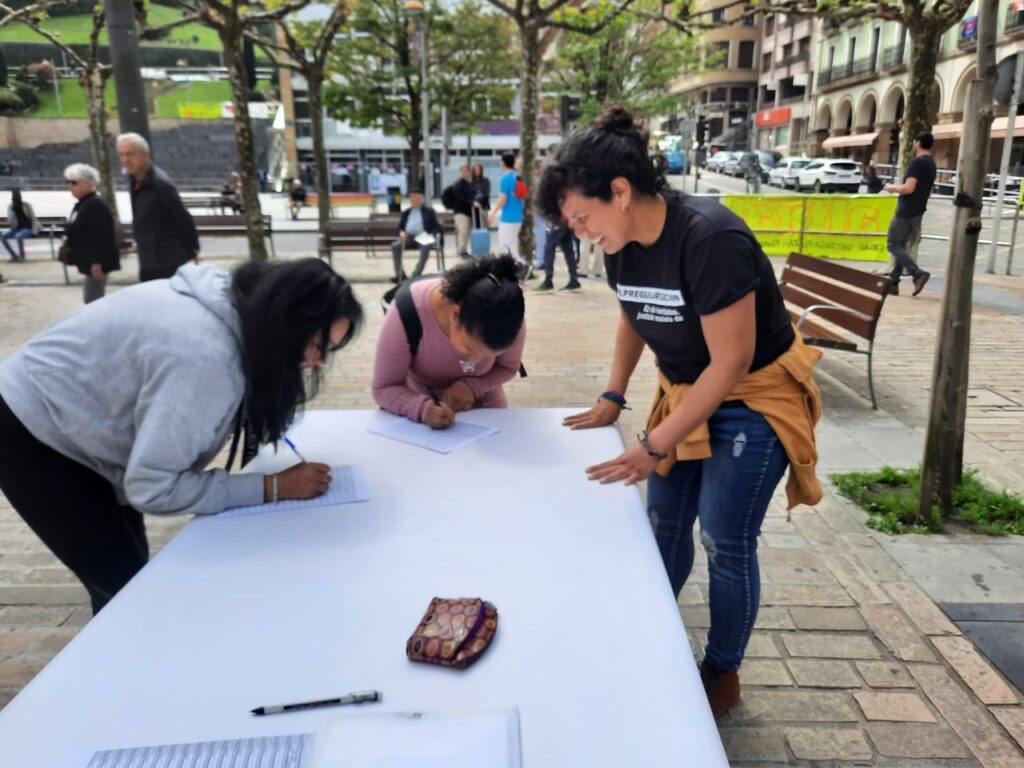
The WMW of Euskal Herria supports the campaign: 500,000 signatures for the regularisation of 500,000 people
The World March of Women of Euskal Herria January 2022 joined the campaign #ILPRegularisation, a campaign that seeks to ask the Spanish parliament to debate the regularisation of migrants; where 6 out of 10 are women and 1 out of 4 are minors.
Migrant feminist activists organized as the Network of Migrant and Racialised Women, Emakume Migratu Feministak Soziosanitarioak, and other organizations supporting migrants, such as Ongietorri Errefuxiatuak, are leading this campaign in the Basque Country.
In Spanish State, Catalonia and Madrid account for almost 50% of the irregular migrant population (23% and 22%, respectively). They are followed by the Valencian Community (14%), Andalusia (9%), and the Basque Country (8%).
According to recent estimates, some 124,000 children live in Spanish State in an irregular situation, most of them with their families. More than half (60 percent) of this population is under 10 years old and the vast majority are from Latin America. Most of the adult migrants in an irregular administrative situation are workers, but their conditions are not the same as those of others. Trade unions and social organizations have denounced working conditions below minimum legal standards and collective agreements, which have a negative impact on wages, breaks, working hours, sick leave, holidays, and health and safety at work.
The collection of signatures is mainly carried out on the streets; so far, 321,649 signatures have been collected throughout Spanish State; therefore, work will continue until December to reach the goal of 500,000 signatures. As the World March of Women, we will continue to support this campaign for social justice.
MENA – Middle East and North Africa
WMW Lenanon: We refuse, we stand in solidarity, we act
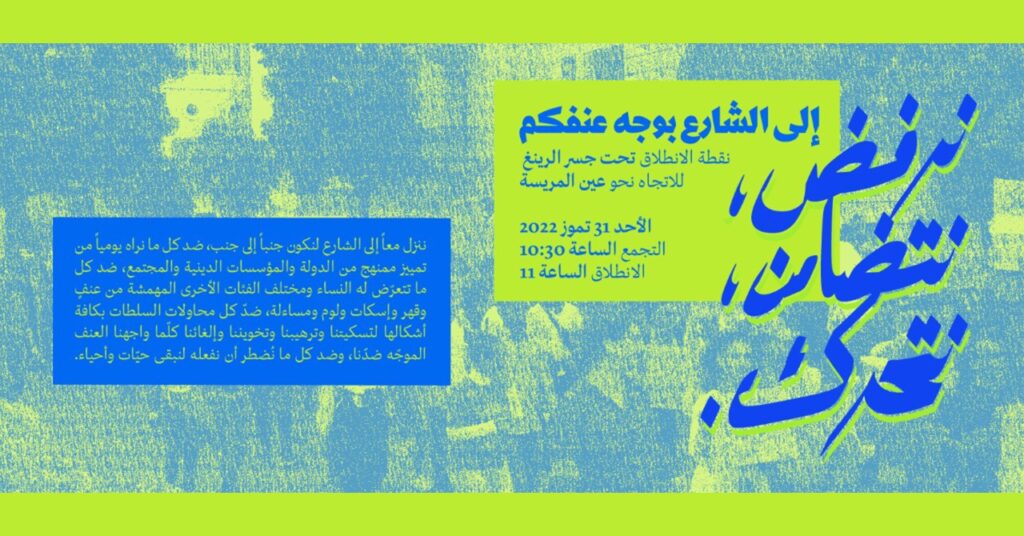
We take to the streets to stand together against the systemic discrimination perpetuated by the state, by religious institutions, and by society. Against the violence, subjugation, and victim-blaming that women and other marginalized groups have been subjected to, against the authorities’ attempts to intimidate, silence, and erase us every time we retaliate, and against all the things we shouldn’t have to go through just to stay alive.
We take to the streets because we believe survivors and we support those who have been silenced, until the time comes when they’re able to break their silence and to break the cycle of violence and oppression, we take to the streets for those who cannot speak up.
We take to the streets because the system has impoverished and starved us, stolen our public property, destroyed our economy, and discriminated against us because of our gender, nationality, disability, color, and other differences that do not conform to patriarchal standards and categorizations. We take to the streets because the state continues to treat us and our care and domestic work as invisible.
We take to the streets because in trying to materially sustain ourselves, our mental health and ability to keep going is diminishing.
We take to the streets to expose the state’s deceptive discourse. The state has invested in distorting public opinion through a discourse of hate and provocation against marginalized groups. This was done in an attempt to cover up for years of theft committed by the state and the banking sector instead of dealing with the concerns of and injustices faced by residents.
No power, no water, no public transportation, no health coverage, telecommunication services have been dollarized, women and children are being killed, raped and violently abused without any accountability and under the protection of the powerful, the environmental situation is deteriorating continuously, schools are almost closed except for the affluent class, and the project to privatize and loot state property is becoming clearer every day… But the Lebanese state is busy targeting, demonizing and inciting against various marginalized social groups, and portraying them as the monster threatening security, stability and civil peace, in an attempt to regain its popularity by selling fake victories. The state has always doubled down on violence and tried to control it during crises, with the aim of directing popular rage away from it.
The state is united in its violence against us – with its institutions, media and agencies – the same violence that protects rapists and is inherently complicit in killing women, suppressing the queer community, inciting violence against refugees and exploiting migrant workers under the Kafala system. Which safety and security are we to make this system responsible for? Our only option is to build solidarity and protect one another.
Therefore, we take to the streets and affirm that the economic, social, political, environmental, health, educational, spatial rights and all kinds of liberties are basic, non-negotiable rights; and that any woman/person living in Lebanon, whoever they are, has the right to obtain them. Rights are indivisible, and attacks against any social group will soon spread to other groups.
We take to the streets for ourselves and for others who do not have the luxury of doing so, or the privilege of being visible, of speaking out, expressing, challenging and movement.
We take to the streets today, against all forms of oppression, persecution, discrimination and racism, and against hate speech and incitement. We take to the streets for everyone who is blamed today, in silence, for all those who were oppressed for being different, and for those who are invisible.
We take to the streets to be side by side, today and every day.
World March of Women – Lebanon

Palestinian Women’s Organizations Struggling for Freedom
We from WMW are in international feminist solidarity and accompanying the situation of sisters from the Union of Palestinian Women’s Committees (UPWC), who have been suffering from violations by the Israeli occupation.
At dawn on August 18, the occupation dared to close 6 headquarters of human rights organizations, including UPWC. This was not the first time this has happened. Documents, files, equipment and belongings were confiscated. All female employees and administrators are subject to arrest. Our sister Tahreer Jaber was interrogated and threatened by Israeli intelligence.
